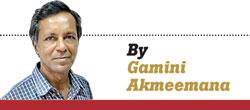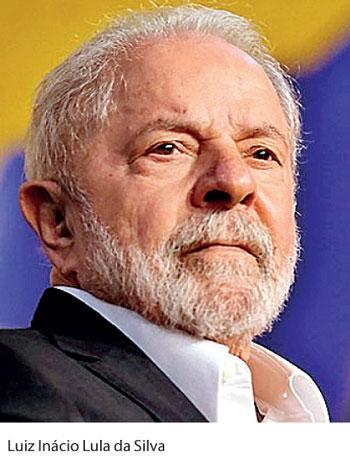Reply To:
Name - Reply Comment
A Lula victory would be good news not just for Brazil and the Amazon, but also for the Latin American left. Since 2018, leftist leaders have gained power in countries ranging from Peru to Mexico and Argentina
 While the news is bad from almost everywhere in the world, the return of former president Luiz Inacio Lula da Silva in Brazil to challenge incumbent president Jair Bolsonaro is something to cheer about.
While the news is bad from almost everywhere in the world, the return of former president Luiz Inacio Lula da Silva in Brazil to challenge incumbent president Jair Bolsonaro is something to cheer about.
Another round of Bolsonaro rule would not only fracture Brazil politically but doom the Amazon forest to a point of no return ecologically, with grave repercussions on global warming regionally as well as internationally.
While Lula did not win an outright victory in last week’s elections, as was widely expected, his mere presence is a source of comfort to millions of Brazilians fed up with Bolsonaro’s policies favouring the rich.
 In Brazil, a candidate must win over 50% of the vote to become president. Failure to do so would result in a runoff after one month. This is the likely scenario now in Brazil, leading to widespread nervousness and speculation. Though Brazil’s electronic voting system is internationally respected, Bolsonaro is unlikely to go quietly if Lula gets more votes in the runoff.
In Brazil, a candidate must win over 50% of the vote to become president. Failure to do so would result in a runoff after one month. This is the likely scenario now in Brazil, leading to widespread nervousness and speculation. Though Brazil’s electronic voting system is internationally respected, Bolsonaro is unlikely to go quietly if Lula gets more votes in the runoff.
Both are charismatic politicians. But the handsome former army captain Bolsonaro is a foul-mouthed right-wing populist who admires Donald Trump and Augusto Pinochet while advocating the use of personal firearms in Brazil; the older Lula is a left-wing ex-trade unionist whose presidency created an economic miracle, lifting millions of Brazilians out of poverty.
Lula stepped down after two terms in 2010 with approval ratings close to 90%. But the following decade saw his Workers’ Party (PT) embroiled in corruption scandals and accused of plunging Brazil into a brutal recession.
Lula was jailed in 2018 on corruption charges and barred from running in that year’s election, which Bolsonaro won. Lula’s 580-day imprisonment seemed to doom him politically, a sad end to someone who rose from rural poverty to become one of the world’s most popular leaders and Brazil’s first working-class president in 2002.
But Lula was freed in late 2019 and his convictions were quashed on the grounds that he was unfairly tried by Sérgio Moro, a rightwing judge who was given a cabinet post by Bolsonaro. This landmark judgement paved the way for Inacio Lula’s miraculous and timely political comeback at a time when Brazilians were desperately looking for an alternative to Bolsonaro, who draws his support from Brazil’s evangelical Christians and the largely white social and business elites.
A Lula victory would be good news not just for Brazil and the Amazon, but also for the Latin American left. Since 2018, leftist leaders have gained power in countries ranging from Peru to Mexico and Argentina. Gustavo Petro, a former guerrilla, won power in Colombia in June and former student leader Gabriel Boric became president of Chile in December 2021. Except in post-Hugo Chavez Venezuela, they have stayed democratic.
Millions of Brazilian voters have displayed their faith in Lula and his pledge to fight poverty and hunger. Out of a population of 156 million people, 33 million are now facing hunger after Bolsonaro’s neglect of the welfare projects launched by his predecessor, and also due to the former’s disastrous Covid-19 policies which saw 674,482 Brazilians die from the pandemic. Lula won the admiration of his people and international acclaim for using a commodities boom help millions escape poverty.
But there are great fears that a defeated Bolsonaro would plunge Brazil into anarchy with a Trump-style coup. Trump’s coup failed because the US military decided to stay out of politics. But Brazil has a darker history of 21-year-long brutal military rule which finally ended in 1985, paving the way for Brazil’s resilient democracy. But the military may hopefully (just like in Sri Lanka) decide that backing Bolsonaro now would be unwise given the popularity of Lula and the temper and mood of its hungry millions.
If elected, Lula faces enormous challenges. Environmental and Indigenous activists backed Lula and would expect him to fight deforestation, stamp out illegal gold mining and to halt the assault on the Amazon that has unfolded under Bolsonaro. “With Bolsonaro we die, with Lula we live,” said the Indigenous rights group Opi, which was co-founded by the recently murdered activist Bruno Pereira.
Fire, drought and land clearance has pushed the Amazon forest to a point of no return. But Bolsonaro didn’t care. Like Donald Trump, he believes that climate change is a left-liberal invention and is focused on serving business interests. Just last week, the government shifted responsibility for forest fire satellite monitoring away from the National Institute for Space Research, a scientifically-robust organisation that had carried out the task for decades. Control has been given to the National Institute of Meteorology, which is under the influence of the agriculture ministry and the farming sector.
In the past few months, the Brazilian congressional committee has approved a bill – PL 490 – that has been described as the greatest assault on indigenous rights since the launch of the Brazilian constitution in 1988 despite widespread local and international protests.
Under Bolsonaro, Amazon’s protective framework has been weakened contrary to scientific advice. Brazil is in the midst of a widening drought that has seen water inflows at some hydroelectric plants fall to 91-year lows. This is a cause and an effect of forest clearance.
Since Bolsonaro took power in 2019, deforestation and fire in the Amazon have risen to their highest levels in more than a decade. The past three months have continued that trend, though slightly behind last year’s peaks. Given the extremely dry conditions in many parts of the Amazon, there are fears that the usual peak of the fire season in July and August could be worse than usual.
This causes problems which go beyond Brazil’s borders. At a local level, land clearance and burning led to extended droughts and higher temperatures, which in turn weakens the resilience of the ecosystem and leads to more fire.
At a regional level, this can intensify drought because the rainforest acts as a pump to drive humid weather systems across a wide area of Brazil, South America and the Atlantic. When the forest weakens, that pump is less effective.
There are also global repercussions because land clearance is turning the Amazon region from climate friend to climate foe. A study published in Nature reveals forest burning has resulted in alarmingly high CO2 levels, greater than the remaining vegetation is able to absorb. This accelerates global heating. Global market forces are partly responsible as more forest is cleared when the prices of soya, beef and gold are high.
Amazon deforestation was reduced by 80% between 2004 and 2012 under the administration of Lula. Bolsonaro has steadily dismantled or discredited the mechanisms that achieved that – satellite monitoring, personnel on the ground and legislation to punish offenders and demarcate indigenous land and conservation areas.
A new presidency under Lula is the essential factor which could save the Amazon from irrevocable destruction. But Brazilians, and those outside hoping to see the last of Jair Bolsonaro, must spend another nerve-wracking three weeks to know for certain.